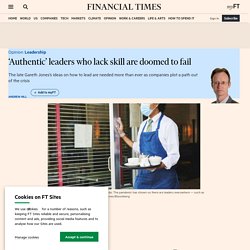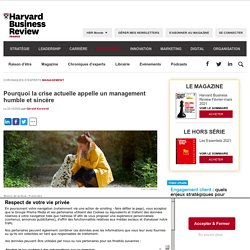

Gestionnaires, partagez vos peurs! Cela vous sera bénéfique, tout autant qu'à votre équipe.

Un pensez-y-bien en cette période marquée par les incertitudes. (Photo: 123RF) Pour traverser une tempête, un dirigeant devrait faire preuve de stoïcisme, être fort et droit afin que son équipe s’en sorte sans heurts... The Real Value of Middle Managers. Employees Are Lonelier Than Ever. Here’s How Employers Can Help. Develop Leaders, Not Just Bosses. Boss vs.

Leader: Help Your New Managers Understand the Difference Managing others, especially for the first time, isn’t all it’s cracked up to be. First-time managers face common challenges, such as balancing multiple demands, leading a team, and motivating others. Lessons from Senior Leaders: What Leadership Development Means Today. The 6 Leadership Skills Middle Managers Need to Advance. 1.

Thinking and Acting Systemically This requires seeing the big picture, broadening your perspective, seeing patterns in relationships and processes, and dealing with the uncertainties and trade-offs that are part of the complexities of organizations. Give up the need to constantly please. While trying to please everyone, you may find that you’re doing a lot each day, but doubting your ability, impact, and success.
Can you succeed without being a terrible person? People often think they have to be ruthless to succeed: as the old saying has it: “Nice guys finish last.”

But I’ve spent several years looking at that in practice, and it turns out the real world is more nuanced. Although individuals who are too soft will indeed finish last . . . this doesn’t mean individuals at the opposite extreme, arrogant or constantly Machiavellian — or encouraging mobs to attack their own nation’s seat of government — are always going to have much lasting success either. The pandemic has shown just how important finding the right balance — finding “fairness” — can be. In the world’s various lockdowns, for example, think of the resentment that arose wherever populations felt their leaders were being unfair — and how hard that made it to carry out public health measures.
Or the way the strongman-style of government, with leaders ostentatiously used to declaring their superiority, ended up blinding themselves from useful information. How acts of leadership kindness make everyone better. It is now a given that the pressure cooker of coronavirus accelerates corporate change.

But the crisis also boils sensible management ideas into leadership clichés in record time. Take humanity, empathy and compassion. By the end of last year, almost every chief executive I interviewed was humble-bragging about how the crisis had taught them to appreciate the stress staff were under and to lead with a human touch.
‘Authentic’ leaders who lack skill are doomed to fail. I have a question for Bill Michael, former chairman of KPMG UK: why would anyone want to be led by you?

That is what Gareth Jones and Rob Goffee used to ask groups of executives. “Without fail, the response is a sudden, stunned hush. All you can hear are knees knocking,” they wrote in Harvard Business Review in 2000, in the article that spawned their bestseller Why Should Anyone Be Led By You? Série Leadership - Les temps changent… et les leaders aussi ! Au cours des dernières décennies, de nombreuses recherches ont été effectuées sur le leadership.

Quelles sont les caractéristiques qui font qu’on attribue à un individu les qualités d’un meneur? Ce sujet fascine, mais est loin d’avoir livré tous ses secrets. Pourquoi la crise actuelle appelle un management humble et sincère. Chroniques d’experts Management Le 22/10/2020 © Getty Images.

Gestion de la performance à distance. Le télétravail: enjeux et sources de succès. Préambule Plébiscité aussi bien par les employeurs que les employés, la thématique du télétravail est désormais sur toutes les lèvres et au cœur de l'actualité sur le travail.

Afin d’aider les entreprises et les gestionnaires dans leur démarche d’appropriation et d’opérationnalisation de cette nouvelle forme d’emploi, nous avons pensé judicieux de proposer dans cet article d’expert un tour d’horizon de la connaissance à ce sujet. Les principaux déterminants pouvant possiblement être associés au succès ou à l’échec de cette forme du travail y sont présentés. Depuis la pandémie, le télétravail a beaucoup progressé au Québec. Série Performance - Comment gérer la performance à distance? «Sans supervision étroite, les employés travailleront bien moins!»

Cette affirmation d’un cadre d’entreprise renvoie à un discours partagé par de nombreux gestionnaires. Pourtant, rien n’est moins sûr. Cette croyance tenace a largement contribué au fait qu’au cours des dernières années, même si la technologie permettait le déploiement du travail à distance, le Canada est demeuré l’un des pays de l’Organisation de coopération et de développement économiques (OCDE) où le télétravail s’est le moins répandu. Un coup de sonde, mené en juin 2020 par l’Ordre des conseillers en ressources humaines agréés (CRHA), a révélé que seulement 45 % des organisations avaient une politique qui encadrait le télétravail. 17 Resources for Remote Work and Virtual Leaders. COVID is Challenging Leaders (and Revealing New Ones) Workforce well-being, the employee experience, and organizational culture are being tested in a very big way.
In fact, according to research conducted by i4cp over the past few months, significant changes to all three are looming: In a poll of more than 100 senior-ranking HR leaders who took part in the May 1, 2020 i4cp CHRO COVID-19 Action Series call, “workforce well-being” received the most votes (58%) to the following question: Over the next year, which of the following do you believe will be altered the most at your organization as a result of this crisis? The second most popular (Talent Acquisition) received only 16% of the votes. In the ongoing study Next Practices in Employee Experience, 69% of more than 550 business professionals surveyed indicated they believe the COVID-19 pandemic will change what employee experience means at their organizations to a high or very high extent.
How 2020 Changed What it Means to Be a Leader. Scholar, author, and researcher on organizational leadership Warren Bennis often said, “managers do things right, leaders do the right thing.” The past 12 months have truly tested that mantra; 2020 found us all careening from one crisis to another: A pandemic that has killed more than two million people worldwide, global economic crisis that has left ten-of-millions of the most vulnerable unemployed, social upheavals that put a spotlight on the harsh reality of racial inequality, and political turmoil that tested the democracies in many countries.
Indeed, at times it has felt as if society were having a collective nervous breakdown. All of this upheaval has forced a multitude of changes to society, education, work, and business. It has also driven distinct changes in the ways in which leaders guide their organizations, according to research by the Institute for Corporate Productivity (i4cp). Balado 17 - Les clefs d'une saine gestion du télétravail. Le contexte actuel a obligé les entreprises et les employés à s’adapter rapidement et à se tourner vers le télétravail afin d’assurer une continuité des activités. Gestionnaires, dirigeants et responsables doivent maintenant composer avec une nouvelle réalité, celle d’assurer une saine gestion à distance.
Mais comment agir afin de conserver les liens et assurer une efficacité et une performance malgré la distance ? HEC Paris - Manager dans la tempête. HEC Paris - Leading Remote Teams. Pourquoi la crise actuelle appelle un management humble et sincère.